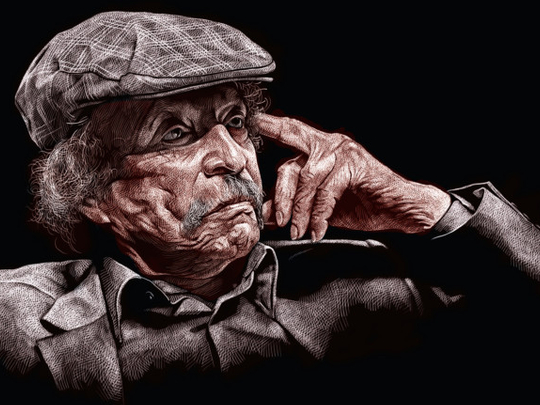
“My ambition was to become a film director,” says Kuwaiti writer Ismail Fahd Ismail when we meet at the Fairmont Hotel in Abu Dhabi. His novel Al-Sabiliat was shortlisted for the 2017 International Prize for Arabic Fiction. Al-Sabiliat explores the reason behind the existence of a green artery in the midst of a vast wasteland in Iraq following the longest war of the 20th century, between Iraq and Iran. This conversation turned out to be our last as Ismail died on September 25 in Kuwait at the age of 78.
Ismail was born in the village of Al Sabiliat near Basra, Iraq, in 1940. The sight of the blue skies there was forever seared in his memory alongwith its marshes and the houses woven of papyrus, floating gently on water. Ismail often drew inspiration from his hometown of Al Sabiliat, drawing deeply from his memories.
Meeting the late novelist was always a pleasure in itself as he shone with humility, love and pride.
“I lived in Iraq for a quarter of a century. I was treated as a Kuwaiti,” he recalled. “When I came back to Kuwait as a teacher, they treated me as an Iraqi, knowing that I was a Kuwaiti.”
Excerpts from the interview:
Your novels are written in a cinematic style. Is this deliberate?
My ambition was to become a filmmaker and I read a lot in this field and its aesthetics. But the film industry is a world that requires structure and financial flexibility. I was living between Iraq and Kuwait, and I had two special circumstances although I was competing with one of my friends, film director Qassem Hawal. So, I failed to achieve my wishes in [the cinematic field]. Thus, my novels had a cinematic character. After writing many novels, I began to mature along with my novels, where my recent novels reached the stage of narration in depth. I applied film editing to write my novels as an alternative to cinema.
Does modern technology help you connect with your readers?
The emergence of literary clubs — there are around 100 in Kuwait now — and each club consists of 20 to 25 members, and it’s a good phenomenon. These clubs began competing in hosting novelists and writers and conducting dialogues with them. This has led to the flourishing of Kuwaiti publishing houses. It is noticeable that publishing houses are crowded with readers, and as you know that Kuwait has provided a lot of culture, and highlighted the support of the publication of distinguished cultural magazines.
In your novels, the characters are invariably Iraqi, and then mostly from the south.
That’s true. My characters are still Iraqi, southern in essence. We have a popular Kuwaiti proverb saying: ‘A grown-up cat cannot be adapted to you.’ This is normal because I lived for the first quarter century of my life in Iraq and the other half century in Kuwait. I am primarily Kuwaiti, and my first four novels were originally Iraqi because I expressed my hometown and the environment in which I grew up. I always visited Basra, back and forth, to inspect my first world.
In your visit to your hometown of Al-Sabiliat, you focused on Iraqi women and their spirit of resistance during the war.
Al-Sabiliat is the name of the village where I was born in the district of Abu Al Khasib in Basra. The hero of this novel is the old woman Umm Qasim who witnessed the horrors of the Iran-Iraq war. The novel was inspired by the youth association Loyak which later performed a drama inspired by the novel as well as [presented] a documentary about me in three parts. The people of Al-Sabiliat gathered and attended the signing ceremony, as well as writers and critics from various generations, including Mohammad Khudair, Yassin Al Nusair and Makdad Al Masaoud.
Do you consider Al-Sabiliat as your most mature novel?
I wrote Al-Sabiliat through many stages. I started writing it in 1989 until I travelled to Basra to my village and hometown two years ago. There I wanted to become more familiar with the place, memories and people. This village lived through difficult times during the Iran-Iraq war. My novels are the result of the investigation, and I did not write the novel until I started listening to the people’s opinions. This has taken a long time, and led to two cases: nostalgia breeds transparency in writing; and secondly, I checked the vocabulary of the place so as not to make a mistake — my childhood friends provided me with the information I missed.
Do you draw inspiration from your own experiences or your imagination?
My literary experience goes back to cinema — my first love. I lived through the era of military coups, transformations and changes. In the 1950s and 1960s, we lived through all the intellectual stages of Marxism to nationalism, and then we entered the Daesh stage. I am 77 years old. To answer your question about how my novels are inspired, I can say there are novels that have lived with me since I was 20 years old but I did not write them until recently. I have always a reserve of [plots for] novels.
For instance, I wrote a novel about my relationship with my friend Naji Al Ali, the Palestinian cartoonist who was killed in London in 1987. I had a literary, artistic and humanitarian relationship with him during his work in Kuwait. We were meeting at forums because I love cultural work. His assassination caused me a heartache, so he lived with me in the novel that took many years to write. It was my duty to write about the history of my relationship with this great artist, starting with our relationship from the 1960s until the moment of his assassination.
So I write only about experiences that I have personally experienced or [topics] I know well.
Why did you focus on writing only when you are talented in so many other fields?
Perhaps novels allow me to meet directly with the public without an intermediary. The novel gives us a wider space in imagination and communication, and allows us to know daily life in a public and individual way. This explains why philosophers such as Voltaire, Nietzsche, and Jean-Paul Sartre used to write and prefer novels more than other arts.
What is your opinion about novels that are inspired by other existing novels?
We are living now in an age of experimentation, so novel writing has become dependent on other arts such as classical art, theatre and cinema, content and technology. When a novel is linked into the means of communication, the creator had the opportunity to deepen his visions and ideas. Technical and individual experiential work has become limitless. Today, you can read seven novels and find a new experience in each one of them.
How do you view the evolution of the Arab novel, since you have lived through its origins and evolution throughout the years? What is the importance novels in the era of media and social networks?
As of today we live in the era of novel par excellence. For example, Iraqi filmmaker Qassem Hawal wrote two novels. The situation applies to poets and dramatists. For example, the late Saadallah Wanous asked me to write a novel with him. Novels differ in the era of modern media and social networking techniques. The modern techniques that we have seen in our time have facilitated the writing of the novel. For example, writing a huge novel like A Little Death by our friend Mohammed Hasan Alwan would have taken longer if it were written by another writer in the 1950s and 1960s.
Which of the Arab and foreign novelists have influenced you the most?
I can mention Naguib Mahfouz, Abdel Rahman Munif and Hana Minah. The number of Arab writers was limited in the past, not as it is now. As for foreign novelists, I adore Dostoyevsky, especially his final novel The Brothers Karamazov. I like to read Tolstoy...
What about translating your work into foreign languages?
Most of my translations are limited to academics only, and my novel Al-Sabiliat will be translated into Italian and English.
Shakir Noori in an Iraqi journalist and novelist based in Dubai.









